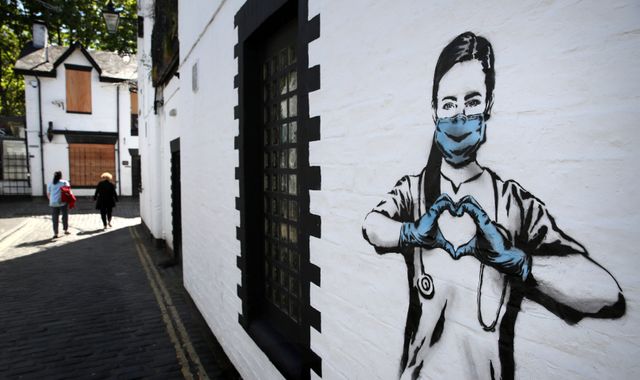Coronavirus: ‘Unrecognisable’ pandemic proving ‘incredibly challenging’, says senior UK epidemiologist
Written by News on 06/05/2020
A top epidemiologist working on the government’s response to COVID-19 has told Sky News the spread of the disease is “a global pandemic that is unrecognisable” and is proving “incredibly challenging”.


But Trish Mannes, deputy director for health protection at Public Health England South East, said the government’s recruitment of “an army of 18,000 contact tracers” is on track.
Ms Mannes is a senior epidemiologist with more than 20 years’ experience in preventing infectious disease outbreaks.
She leads contact tracing teams in the south east of England.
Her expertise was crucial at the start of the outbreak to help contain the spread of the coronavirus when the first clusters were identified.
“The interviews took many hours,” she told Sky News.
“We go to the person, we ask about their symptoms and the point at which they became unwell.
“We asked them to describe in detail what those symptoms are, so that we can work out the point where they may have been infectious. And we get a detailed history.
“You can imagine with COVID-19 we’re asking for close contacts, so anyone who’s been within two metres for more than 15 minutes, so that close contact could include someone in a shop, a pub.
“So we absolutely have to go through a really detailed timeline of every day, each bit of the day, who you work with, who you live with, who you might socialise with outside of work.”
Contact tracing is a highly specialised skill.
Senior contact tracers have scientific or medical backgrounds so, when they work through a detailed timeline of an infected person’s movements, they can calculate exactly when that person was most likely to infect others.
“We work with an incredibly specialist workforce who are absolutely trained for this,” Ms Mannes said.
“This is what we do. The difference is this is at scale.”
Once the coronavirus outbreak was widespread and community transmission was occurring in the UK, contact tracing became less urgent and less effective.
The lockdown measures, in the “delay” phase of the government’s response, stopped the virus from spreading any further.
But now, as the government looks at easing the lockdown, contact tracing will be key in preventing any further outbreaks.
Ms Mannes said: “We’ve never stopped contact tracing. We continue to contact trace. We just changed the focus.
“If you can imagine, the point where that announcement was made was actually when everyone was told to self-isolate and distance from others.
“And, in particular, people who had symptoms were told to go home and stay home for seven days and their families and households for 14 days.
“At that point, that was most of the advice that we were giving to the general population if they were identified as a contact.
“So you can imagine the urgency of the community contact tracing went out of that because people were being advised to minimise their distance from others.
“And that’s certainly been the case up to this point.
“The change in approach to contact tracing is absolutely core to being able to relax those social distancing measures.”
The COVID-19 app launched this week on the Isle of Wight will work in tandem with trained contact tracers.
Both will be crucial if the government’s “test, trace and isolate” strategy is to prove successful.
As people begin to move around again there is a risk of a second wave of infections.
“I think the government’s being very clear about this, the focus is about bringing the reproductive number below one,” Ms Mannes added.
“And so the R0, or the reproductive number, must stay below one if we’re going to contain this.
“With contact tracing, if you can imagine, there’s a really difficult balance to strike.
“Contact tracing allows social distancing measures to be relaxed so that we can minimise the spread from anyone who has the disease.
‘I think, rather than be worried about a second wave, we should think about what we are doing to prevent a second wave.
“Because, clearly if there is a second wave and that second wave is large, that will challenge the NHS, it will cause a lot of morbidity; mortality that we want to prevent.
“We’re preventing a second wave and that’s behind the strategy for scaling up contact tracing to help us to minimise the spread of infection in the community and so allowing the relaxing of some of the social distancing measures by minimising the spread if anyone has it in the community.”
Contact tracing is recognised as the most effective way of breaking the chain of transmission.
The science has not changed but the diseases have and now technology will help the tracers to cope with the scale of COVID-19.
“It will will help us identify a number of contacts and, importantly, that won’t identify all contacts, but it will at least give us some kind of sense of easier people to identify,” Ms Mannes said.
“Each of our cases will then be requested to log into a website.
“And again, that will take details of contacts and will enable us to identify the group of contacts and ensure that those contacts that weren’t picked up with the app for whatever reason can be identified through that method.
“That’s when the people on the phones come in. They can be calling those people getting in touch with them, giving them the advice.”
:: Listen to the Daily podcast on Apple Podcasts, Google Podcasts, Spotify, Spreaker
Ms Mannes and her teams have worked tirelessly around the clock since the very start of this outbreak.
The challenges have been many, both on a personal and professional scale.
“I think as a public health system we have never seen anything on this scale,” she said.
“This is a global pandemic of a scale that is unrecognisable to all of us in our lifetime.
“It has been incredibly challenging personally. There have been a lot of things that have been challenging.
“I think working in the unknowns is incredibly challenging and it requires each of us to be really agile and responsive to some of the challenges and to be able to provide advice and support and reassurance when we don’t always have the answers.”
(c) Sky News 2020: Coronavirus: ‘Unrecognisable’ pandemic proving ‘incredibly challenging’, says senior UK epidemiologist







